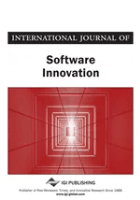
International Journal of Software Innovation
Scope & Guideline
Transforming Ideas into Software Breakthroughs.
Introduction
Aims and Scopes
- Software Development Methodologies:
The journal extensively covers various methodologies employed in software development, including Agile, DevOps, and traditional approaches, focusing on their effectiveness and adaptability in contemporary software projects. - Machine Learning and AI Applications:
A significant focus on the integration of machine learning and artificial intelligence techniques in software development, including predictive modeling, recommendation systems, and intelligent data analysis. - Software Quality and Reliability:
Research on improving software quality, defect prediction, and reliability modeling is prevalent, emphasizing quantitative methods and frameworks for assessing software performance. - Human-Computer Interaction (HCI):
The journal explores how users interact with software systems, including usability studies and the impact of design decisions on user experiences. - Emerging Technologies and Trends:
The journal highlights innovations in software technology, including Internet of Things (IoT), cloud computing, and big data analytics, discussing their implications for software engineering. - Healthcare and Social Impact Software Solutions:
Research on software innovations aimed at healthcare and social issues is prioritized, showcasing the role of technology in addressing societal challenges.
Trending and Emerging
- Artificial Intelligence in Software Solutions:
An increasing number of studies are exploring the application of AI and machine learning across various domains, highlighting their transformative potential in software innovation. - Data-Driven Decision Making:
Research emphasizing data analytics and machine learning for predictive modeling and decision support systems is on the rise, demonstrating the importance of data in modern software applications. - Internet of Things (IoT) Applications:
There is a growing interest in IoT applications and systems, showcasing the integration of software innovation with connected devices and the challenges they present. - Healthcare Technology Innovations:
The journal is increasingly publishing research on software solutions for healthcare, reflecting the significant role of technology in improving health outcomes and patient care. - Sustainable Software Engineering:
Emerging themes around sustainability and the environmental impact of software systems are gaining traction, indicating a shift towards responsible software development practices.
Declining or Waning
- Traditional Software Engineering Practices:
There has been a noticeable decline in papers focusing on conventional software engineering practices and methodologies, as the field shifts towards more agile and adaptive approaches. - Hardware-Dependent Software Optimization:
Research directly related to optimizing software for specific hardware configurations has decreased, likely due to the increasing abstraction provided by cloud services and virtualization. - Basic Programming Techniques:
Papers centered on foundational programming techniques or languages have waned, suggesting a movement towards more complex applications and integrations rather than basic coding practices. - Static Analysis Tools:
The focus on static code analysis tools has diminished, replaced by a greater interest in dynamic analysis and machine learning approaches for software testing and quality assurance. - Legacy Systems Maintenance:
Research on maintaining and upgrading legacy systems has decreased, reflecting a trend towards modernization and the adoption of new technologies instead of focusing on older systems.
Similar Journals
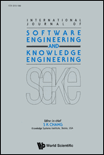
INTERNATIONAL JOURNAL OF SOFTWARE ENGINEERING AND KNOWLEDGE ENGINEERING
Advancing Software and Knowledge FrontiersThe INTERNATIONAL JOURNAL OF SOFTWARE ENGINEERING AND KNOWLEDGE ENGINEERING, published by WORLD SCIENTIFIC PUBL CO PTE LTD in Singapore, is a pivotal platform for disseminating cutting-edge research in the fields of software engineering and knowledge systems. With an ISSN of 0218-1940 and an E-ISSN of 1793-6403, this journal has been a reliable resource for scholars and practitioners since its inception in 1996. The journal is indexed across multiple prestigious databases, reflecting its relevance with a Category Quartile ranking of Q3 in both Computer Graphics and Computer Networks for 2023, and it maintains a steady trajectory of growth and scholarly contribution. Although not an Open Access journal, it is accessible through various academic institutions and libraries, ensuring researchers can engage with high-quality, peer-reviewed articles that explore advancements, theoretical developments, and practical applications in software and knowledge engineering. As it converges towards its end year of 2024, this journal continues to foster innovation and knowledge exchange, making it an essential resource for anyone invested in these dynamic fields.

Journal of Computer Languages
Empowering Knowledge in Computer LanguagesJournal of Computer Languages, published by ELSEVIER SCI LTD in the United Kingdom, serves as a crucial platform for advancing research and discussion in the fields of computer networks, human-computer interaction, and software development. With an ISSN of 2590-1184 and E-ISSN 2665-9182, this journal has established itself as a prominent resource within its category, achieving Q3 rankings in 2023 across its respective domains. As part of Scopus' indexed journals, it stands at impressive ranks of #152/395 in Computer Networks and Communications, #172/407 in Software, and #76/145 in Human-Computer Interaction, reflecting its relevance and contribution to the scholarly community. Operating under an open access model, the journal emphasizes accessibility and collaboration among researchers, professionals, and students keen on exploring innovative applications and advancements in computer languages. With a publication span extending from 2019 to 2024, the year-to-year growth reinforces its commitment to impacting both academia and industry significantly. Engage with cutting-edge research and foster your understanding in computer languages through this essential publication.
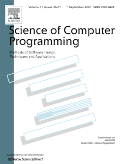
SCIENCE OF COMPUTER PROGRAMMING
Elevating Knowledge in Computer Programming and BeyondScience of Computer Programming, published by Elsevier, is a leading journal dedicated to advancing knowledge in the fields of computer programming, computational theory, and software development. With a focus on interdisciplinary research that spans computational methodologies, information systems, and simulation modeling, this journal plays a vital role in disseminating innovative findings and fostering collaboration among experts in these dynamic areas. With a respectable impact factor and ranked in various Scopus Categories such as computational theory (Q3) and information systems (Q2), it provides a platform for high-quality scholarly articles that push the boundaries of programming science. Although currently not open access, the journal offers invaluable insights for researchers, professionals, and students alike, ensuring they are equipped with the latest advancements and methodologies to thrive in an ever-evolving technological landscape. The journal covers research from its convergence starting in 1981 and continues to welcome groundbreaking contributions as it looks forward to an exciting future through 2025 and beyond.
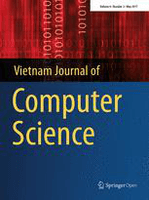
Vietnam Journal of Computer Science
Bridging theory and application in the vibrant field of computer science.Vietnam Journal of Computer Science, published by World Scientific Publishing Co Pte Ltd, serves as a prominent platform for researchers and professionals in the rapidly evolving field of computer science. Launched as an Open Access journal in 2013, it aims to disseminate high-quality research across various subfields, including Artificial Intelligence, Computational Theory and Mathematics, Computer Vision, and Information Systems. With its ISSN 2196-8888 and E-ISSN 2196-8896, the journal provides valuable insights and contributes to the growing body of knowledge in computer science, particularly in Southeast Asia. Despite its relatively recent establishment, the journal has achieved significant rankings, including Q3 status in multiple categories and notable visibility in Scopus metrics, evidencing its commitment to fostering innovative research. This journal is essential for those looking to stay at the forefront of computational advancements and applications, particularly in Vietnam and beyond, facilitating an engaging dialogue among scholars and industry professionals.
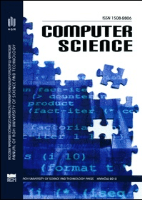
Computer Science-AGH
Exploring Diverse Dimensions of Computer ScienceComputer Science-AGH, published by the AGH University of Science & Technology Press in Poland, is an esteemed open access journal that has been disseminating high-quality research since 2004. With ISSN 1508-2806 and E-ISSN 2300-7036, this journal focuses on a diverse range of areas within the computer science discipline, including but not limited to Artificial Intelligence, Computational Theory, Computer Graphics, and Networks. While it currently holds a Q4 ranking across several categories as of 2023, it actively promotes research that contributes to the academic community's understanding and evolution in the field. The journal's commitment to open access ensures that vital research is accessible to a wider audience, fostering collaboration and innovation. With its comprehensive focus and strategic publication goals, Computer Science-AGH plays a crucial role in advancing the frontiers of computer science research and education, making it an invaluable resource for researchers, professionals, and students alike.
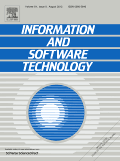
INFORMATION AND SOFTWARE TECHNOLOGY
Advancing the Frontiers of Software and Information TechnologyINFORMATION AND SOFTWARE TECHNOLOGY, published by Elsevier, is a leading journal that stands at the forefront of the fields of software engineering, information systems, and computer science applications. Since its inception in 1970 and with a focus extending to 2025, this esteemed publication has made significant contributions to the discourse on technological advancements and innovations. In 2023, it has achieved a remarkable Q1 categorization across multiple domains, including Computer Science Applications, Information Systems, and Software, reflecting its excellence and relevance in the academic community. With Scopus rankings that place it in the top percentiles in its categories (85th, 83rd, and 83rd respectively), the journal serves as an essential platform for researchers, professionals, and students eager to disseminate and engage with cutting-edge research and developments. While it does not currently offer Open Access options, the knowledge curated within its pages remains invaluable for advancing the fields of information technology and software development.
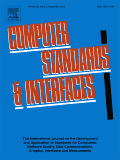
COMPUTER STANDARDS & INTERFACES
Fostering Knowledge and Best Practices in Technology Standards.COMPUTER STANDARDS & INTERFACES is a prestigious journal published by Elsevier, dedicated to the intersection of technology, law, and standards in computing. With an impressive impact factor and categorized in the Q1 quartile across several relevant fields, including Computer Science Applications, Hardware and Architecture, and Software, this journal has established itself as a critical resource for researchers and professionals alike. Covering a comprehensive range of topics over its converged years from 1986 to 2025, it provides rigorous peer-reviewed articles and vital insights into the evolving landscape of computer standards. The journal's Scopus rankings affirm its significance with top percentiles in multiple categories, including a remarkable 12th rank in Social Sciences and Law. COMPUTER STANDARDS & INTERFACES welcomes contributions that push the boundaries of knowledge and foster discussions on best practices and innovations, making it an invaluable platform for students and seasoned researchers passionate about advancing the field.

PeerJ Computer Science
Transforming Knowledge Sharing in the Digital AgePeerJ Computer Science is a leading open access journal published by PEERJ INC, dedicated to the field of computer science. Since its inception in 2015, it has made significant strides in promoting scholarly communication and accessibility to cutting-edge research. With an impressive impact factor reflected by a Q1 ranking in the Computer Science (miscellaneous) category and a Scopus rank of 51 out of 232, this journal stands at the forefront of its field. The journal's open access model ensures that groundbreaking findings are readily available to researchers, professionals, and students alike, fostering collaboration and innovation in the ever-evolving landscape of computer science. As it continues to publish until 2024 and beyond, PeerJ Computer Science remains an essential resource for those seeking to stay ahead in their research and practice.
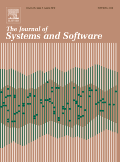
JOURNAL OF SYSTEMS AND SOFTWARE
Connecting Experts to Drive Software Innovation.JOURNAL OF SYSTEMS AND SOFTWARE, published by Elsevier Science Inc, is a premier academic journal that serves as a vital platform for the dissemination of cutting-edge research in the fields of software engineering, information systems, and hardware architecture. With an impressive impact factor and consistently ranking in the Q1 category across several relevant sectors, including hardware and architecture (ranked 33rd out of 177), information systems (ranked 72nd out of 394), and software (ranked 75th out of 407) as of 2023, this journal is recognized for its rigorous peer-review process and high-quality publications. Established in 1979, the journal has become an essential resource for researchers, professionals, and students looking to stay abreast of the latest advancements and emerging trends in systems and software. While the journal does not currently operate under an open-access model, it ensures wide visibility through its indexed publications and is dedicated to advancing scholarly discourse in computer science. With contributions from leading experts in the field, JOURNAL OF SYSTEMS AND SOFTWARE continues to shape the landscape of software and systems research.

SoftwareX
Bridging Knowledge Gaps in Software ApplicationsSoftwareX is an innovative open-access journal published by Elsevier that has been championing advancements in the fields of Computer Science and Software since its inception in 2015. With a focus on presenting high-quality research, SoftwareX aims to foster collaboration and knowledge exchange among researchers and practitioners, advancing the way software and tools are developed and disseminated within the community. This journal operates under a flexible access model, allowing broad visibility and accessibility to its diverse readership. Positioned in the Q2 and Q3 quartiles of the Scopus ranking system within the domains of Computer Science Applications and Software respectively, SoftwareX stands as an influential platform for sharing cutting-edge methodologies and innovations. The journal's aim is not only to serve as a repository of knowledge but also to embolden practitioners and scholars alike to engage with and implement findings that can accelerate progress within the realms of software engineering and application. Situated in Amsterdam, Netherlands, SoftwareX has embraced an international reach, welcoming submissions that address complex challenges through novel software solutions.